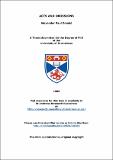Files in this item
Acta and omissions
Item metadata
| dc.contributor.advisor | Bryant, Christopher | |
| dc.contributor.author | Donald, Alexander Paul | |
| dc.coverage.spatial | vii, 300 p. | en_US |
| dc.date.accessioned | 2017-03-01T15:28:27Z | |
| dc.date.available | 2017-03-01T15:28:27Z | |
| dc.date.issued | 1989 | |
| dc.identifier | uk.bl.ethos.328083 | |
| dc.identifier.uri | https://hdl.handle.net/10023/10385 | |
| dc.description.abstract | I identify and examine the grounds on which we describe an agent's non-doing as an omission to do X, and a cause of Y. I distinguish between the formal and material aspects of an omission. This is useful in setting aside obvious differences between actions and omissions, which some writers take to be significant, in particular the view that an omission can be identified with whatever action an agent performs or movement he makes when he omits to X. In fact, he need not make a bodily movement, perform some other action in order to prevent himself from doing X, or decide not to perform X. It is by no means certain that any omission is timeable, and most are certainly not. I note difficulties for any account of intention that is meant to embrace intentional omissions as well as actions. I do not offer a single, all-embracing account of omissions, because I think it is impossible to provide one. I acknowledge the importance of the role of expectation in identifying omissions, particularly as causes, but argue that there are sorts of omissions which are not identified by the presence of defeated expectation. I take the view that some omissions are in an important way indistinguishable from actions and may therefore be regarded as causes. Also that some non-doings which are not omissions may be regarded as causes. I criticise the ability of traditional analyses of causality to comprehend the possibility of omissive causation and expound alternative accounts of what constitutes a cause in order to do justice to that possibility. I find useful Collingwood's account of what it is to speak of causality in terms appropriate to a practical natural science; that is, in the language of means and ends. | en_US |
| dc.language.iso | en | en_US |
| dc.publisher | University of St Andrews | |
| dc.subject.lcc | BC199.O7D7 | |
| dc.title | Acta and omissions | en_US |
| dc.type | Thesis | en_US |
| dc.contributor.sponsor | University of St Andrews | en_US |
| dc.contributor.sponsor | Carnegie Trust for the Universities of Scotland | en_US |
| dc.contributor.sponsor | Humanitarian Trust | en_US |
| dc.contributor.sponsor | West Fife Edcational Trust | en_US |
| dc.contributor.sponsor | Sir Richard Stapley Educational Trust | en_US |
| dc.contributor.sponsor | Gilchrist Trust | en_US |
| dc.contributor.sponsor | Newby Trust | en_US |
| dc.contributor.sponsor | Heinz and Anna Kroch Foundation | en_US |
| dc.type.qualificationlevel | Doctoral | en_US |
| dc.type.qualificationname | PhD Doctor of Philosophy | en_US |
| dc.publisher.institution | The University of St Andrews | en_US |
This item appears in the following Collection(s)
Items in the St Andrews Research Repository are protected by copyright, with all rights reserved, unless otherwise indicated.

